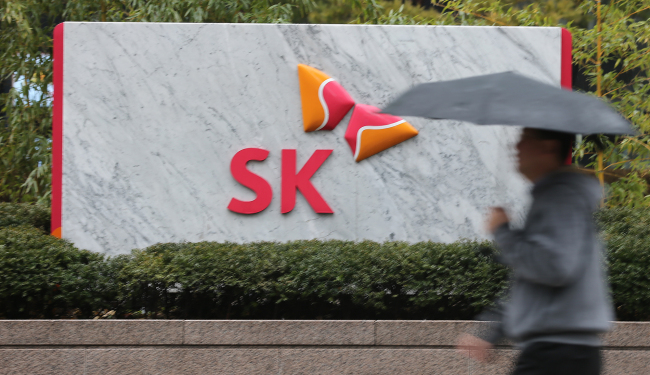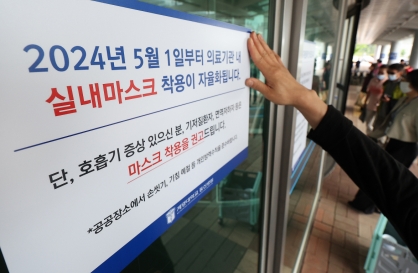Ruling on SK chief signals social shift toward fairer economy
By Korea HeraldPublished : Feb. 1, 2013 - 20:50

Unlike other criminals, many owners of chaebol found guilty at courts used to avoid prison terms or receive lighter punishments. Emphasizing their contribution to the Korean economy and the negative impact that their imprisonment would cause were often cited in court during the course of requesting judicial leniency toward the tycoons.
It worked for many years, but a court’s landmark ruling against SK chairman Chey Tae-won on Thursday broke the long tradition of such leniency and demonstrated that their contribution to the country’s economic growth was no longer an excuse for their criminal activities.
The Seoul court sentenced the owner of the country’s third-largest conglomerate to a four-year prison term for using a massive amount of corporate funds for personal investments. The Seoul Central District Court said Chey’s case showed how a chaebol boss can take company assets as personal property and ordered the 53-year-old tycoon to be put in prison immediately following the verdict.
The sentencing itself was a message to society that the court wouldn’t impose lighter punishment on chaebol bosses committing crimes like in the past, said Song Se-ryeon, professor of law at Kyunghee University.
The professor said that the court could not help but embrace calls from political parties to push for “economic democratization.” President-elect Park Geun-hye also agreed to introduce stricter penalties with jail sentences for chaebol owners for embezzlement or corruption. She reiterated that presidential pardons for business leaders would be limited as well.
“The ruling (on Chey) can be seen as (the court) embracing calls from political circles that have been demanding a tougher stance on (crimes committed by) chaebol bosses,” Song said.
People’s Solidarity for Participatory Democracy, a civil organization famous for its activities to promote economic democratization and chaebol reform, also welcomed the court’s decision, saying that the National Assembly should pass a bill that bans suspended jail terms for chaebol chief executives.
“As the society has reached a consensus on imposing tougher punishment on chaebol owners through the general and presidential election last year, the National Assembly should immediately pass the bill that prohibits the suspension of execution,” it said in a statement.
Other law experts say that the court imposing harsher sentencing on business bigwigs was possible because of the new sentencing guideline that limits judges’ discretion.
The guideline, introduced by a committee of experts from the Supreme Court, civil society and various social fields, suggests four years’ imprisonment as the minimum punishment against anyone who embezzles 30 billion won or more. Thus, the ruling on Thursday indicated that the court was adhering strictly to the new sentencing standards.
Chey was found guilty of embezzling 4.62 billion won from SK Group affiliates and transferring it to an investment firm headed by a former SK executive to buy stock futures and options in 2008.
Despite growing calls for economic democratization by toughening punishment for chaebol crimes, business circles remained concerned about the impact of the ruling as unfavorable to business leaders. Kim Seung-yeon, chairman of Hanwha Group, was also jailed last year on charges of embezzling 320 billion won from group subsidiaries and thereby inflicting damages on them amounting to 480 billion won. The court sentenced him to four years behind bars along with a fine of 5.1 billion won.
“We are concerned that the ruling may spread an anti-corporate spirit in the country,” the Federation of Korean Industries said in a statement.
It also expressed regret that the court had not fully taken into account Chey’s contributions to the domestic economy with both expert management and acts of social contribution, while improving Korea’s image abroad.
By Cho Chung-un (christory@heraldcorp.com)
It worked for many years, but a court’s landmark ruling against SK chairman Chey Tae-won on Thursday broke the long tradition of such leniency and demonstrated that their contribution to the country’s economic growth was no longer an excuse for their criminal activities.
The Seoul court sentenced the owner of the country’s third-largest conglomerate to a four-year prison term for using a massive amount of corporate funds for personal investments. The Seoul Central District Court said Chey’s case showed how a chaebol boss can take company assets as personal property and ordered the 53-year-old tycoon to be put in prison immediately following the verdict.
The sentencing itself was a message to society that the court wouldn’t impose lighter punishment on chaebol bosses committing crimes like in the past, said Song Se-ryeon, professor of law at Kyunghee University.
The professor said that the court could not help but embrace calls from political parties to push for “economic democratization.” President-elect Park Geun-hye also agreed to introduce stricter penalties with jail sentences for chaebol owners for embezzlement or corruption. She reiterated that presidential pardons for business leaders would be limited as well.
“The ruling (on Chey) can be seen as (the court) embracing calls from political circles that have been demanding a tougher stance on (crimes committed by) chaebol bosses,” Song said.
People’s Solidarity for Participatory Democracy, a civil organization famous for its activities to promote economic democratization and chaebol reform, also welcomed the court’s decision, saying that the National Assembly should pass a bill that bans suspended jail terms for chaebol chief executives.
“As the society has reached a consensus on imposing tougher punishment on chaebol owners through the general and presidential election last year, the National Assembly should immediately pass the bill that prohibits the suspension of execution,” it said in a statement.
Other law experts say that the court imposing harsher sentencing on business bigwigs was possible because of the new sentencing guideline that limits judges’ discretion.
The guideline, introduced by a committee of experts from the Supreme Court, civil society and various social fields, suggests four years’ imprisonment as the minimum punishment against anyone who embezzles 30 billion won or more. Thus, the ruling on Thursday indicated that the court was adhering strictly to the new sentencing standards.
Chey was found guilty of embezzling 4.62 billion won from SK Group affiliates and transferring it to an investment firm headed by a former SK executive to buy stock futures and options in 2008.
Despite growing calls for economic democratization by toughening punishment for chaebol crimes, business circles remained concerned about the impact of the ruling as unfavorable to business leaders. Kim Seung-yeon, chairman of Hanwha Group, was also jailed last year on charges of embezzling 320 billion won from group subsidiaries and thereby inflicting damages on them amounting to 480 billion won. The court sentenced him to four years behind bars along with a fine of 5.1 billion won.
“We are concerned that the ruling may spread an anti-corporate spirit in the country,” the Federation of Korean Industries said in a statement.
It also expressed regret that the court had not fully taken into account Chey’s contributions to the domestic economy with both expert management and acts of social contribution, while improving Korea’s image abroad.
By Cho Chung-un (christory@heraldcorp.com)
-
Articles by Korea Herald




![[Music in drama] Rekindle a love that slipped through your fingers](http://res.heraldm.com/phpwas/restmb_idxmake.php?idx=644&simg=/content/image/2024/05/01/20240501050484_0.jpg&u=20240501151646)

![[New faces of Assembly] Architect behind ‘audacious initiative’ believes in denuclearized North Korea](http://res.heraldm.com/phpwas/restmb_idxmake.php?idx=644&simg=/content/image/2024/05/01/20240501050627_0.jpg&u=20240502093000)



![[KH Explains] Will alternative trading platform shake up Korean stock market?](http://res.heraldm.com/phpwas/restmb_idxmake.php?idx=644&simg=/content/image/2024/05/01/20240501050557_0.jpg&u=20240501161906)








![[Today’s K-pop] Stray Kids go gold in US with ‘Maniac’](http://res.heraldm.com/phpwas/restmb_idxmake.php?idx=642&simg=/content/image/2024/05/02/20240502050771_0.jpg&u=)